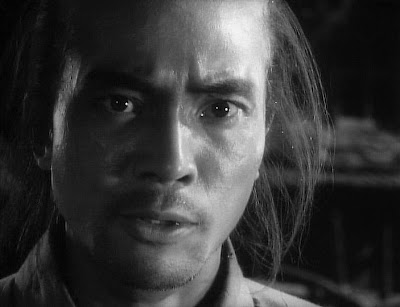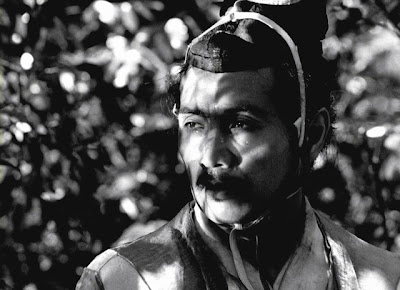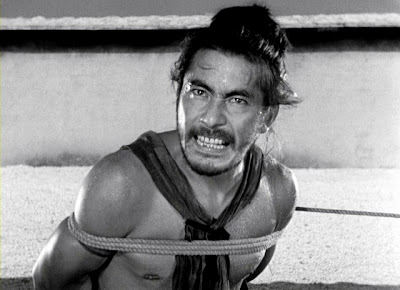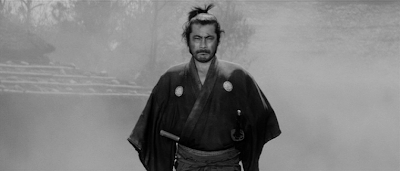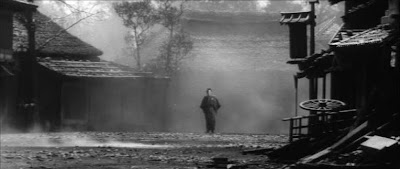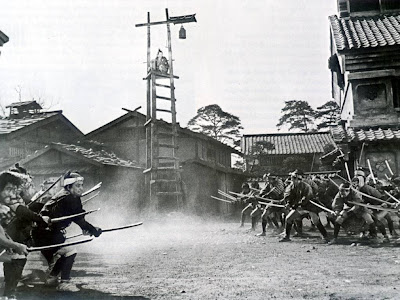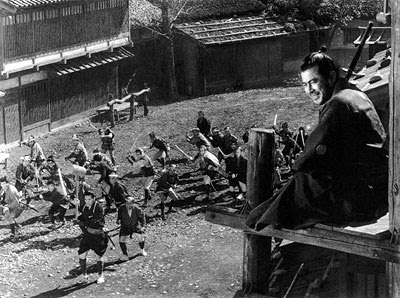Let's start with the obligatory, what was Seven Samurai about question, shall we?
Alex: Sounds good. Seven Samurai is about a small farming village that is on the verge of being wiped out by violent rebels. At their collective wits' end, and terrified of what the future may hold, the villagers seek advice from their elder, who tells them to hire samurai to help defend their home.
After being rejected by many different samurai, one finally agrees to help--accepting payment in food because he is a noble soul. This samurai, named Kambei, immediately sets out to find others to help him defend the village.
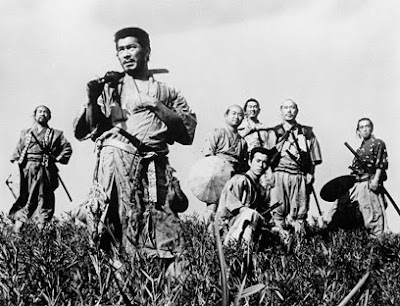 Kambei, along with four other seasoned ronin, one young samurai apprentice, and a farmer (Kikuchiyo, played by Toshiro Mifune) whom they accept as a samurai, become tasked with training the villagers and preparing them for the imminent attack from the rebels.
Kambei, along with four other seasoned ronin, one young samurai apprentice, and a farmer (Kikuchiyo, played by Toshiro Mifune) whom they accept as a samurai, become tasked with training the villagers and preparing them for the imminent attack from the rebels.The battle between villagers and rebels comes in the last hour or so of the film, and leads to...
[SPOILER ALERT]
----
----
----
----
...the samurai and the villagers defeating the rebels and successfully defending their village. [END SPOILERS]
Nathaniel: Yeah, I don't think there's anything I need to add here.
 What modern film/films might you compare Seven Samurai to?
What modern film/films might you compare Seven Samurai to?Alex: Well, the obvious answer is The Magnificent Seven, which was based on Kurosawa's epic. But that film was made in 1960, just six years after Samurai. No, I'm gonna go with (and I know this is cheating, since it was a book first), The Lord of the Rings: The Two Towers. Interestingly, Tolkien's second book in the trilogy was written in 1954, the same year that Kurosawa's film was released in theaters.
It's a coincidence, sure, but a pretty cool one.
I'll speak mostly to the film version of Two Towers, though, because as we watched Samurai, I kept thinking about Peter Jackson, and that film. Much of Samurai is spent anticipating the attack from the rebels. We're in the (now fortified, thanks to the samurai) village, and as the film moves along, we grow just as anxious as the villagers, awaiting the battle.
This was done very effectively, and it really helped put me in the film.
I got a similar feeling while watching Two Towers--that pit in my stomach I developed while thinking about putting myself in the position of one of the fighters. What must it be like days and days before the battle, not knowing exactly when the enemy will strike? Or how about when you finally see the enemy on the horizon, lined up in rows and rows, and you know you're outnumbered?
Kurosawa was able to build up the anticipation for the final battle, and the end result was perfect. Just like in Two Towers, the final battle in Samurai was epic and wonderfully choreographed and filmed.
Nathaniel: What he said.
 Compare this Kurosawa film to the others you've seen.
Compare this Kurosawa film to the others you've seen.Alex: Um, that's not a question. But OK. While I previously stated that Rashomon was my favorite of the five movies we've watched, I need to change that answer. I was totally engrossed in Samurai, from beginning to end. Considering it's an over-three-hour long film, that's saying something, especially with my modern, "let's blow some stuff up and go home" movie-going sensibilities.
Nathaniel: It's strange; of the five films we watched--and please allow me to explain what I mean before you get upset--Seven Samurai was the least distinctive. My experience of The Hidden Fortress was characterized by a lot of "Whoa! I've never seen that in a '50s movie!" moments; Ran was extremely colorful and had a tremendous amount of exposition; Yojimbo felt very much like a Japanese cowboy movie; Rashomon felt very much like a stage play, but Seven Samurai... Maybe I haven't had enough time to reflect on it yet, but no single aspect of the movie stood out as heavily as anything I saw in the other films, but that's by no means a bad thing.
Seven Samurai was not so much a movie as it was an expertly crafted story that happened to have been told through the medium of film. In the other four movies, I'd occasionally pick out specific elements such as a particular actor's performance or a unique camera shot that would take me out of the movie a little bit because I felt moved to analyze it on the spot.
Not so with Seven Samurai; though there is much to analyze, the whole production was organic and subtle, never overdone nor underdone, and every element worked together in brilliant harmony to keep me enraptured in the movie the entire time, or at least until I started to get hungry all of 10 minutes before the built-in intermission.
 What is so appealing about this movie?
What is so appealing about this movie?Nathaniel: Though there are so many good and great things about this film, I think its popularity is most likely rooted in the story: People love a great underdog story, and the characters are wholly relatable--most anyone can identify with the everyday villagers, and the heroes, while so much more talented in combat than any of the villagers could hope to match, are still human. The story stirs up feelings of oppression, fear, hope, and freedom, and those are universal themes.
Alex: The story kept me engaged, the acting was great--again, Mifune shined in his role as haunted farmer/samurai--and I was completely wrapped up in the film. I can't really say much more than that.
 This film was the longest of all the Kurosawa films we've seen; was it difficult to stay focused and awake the whole time?
This film was the longest of all the Kurosawa films we've seen; was it difficult to stay focused and awake the whole time?Nathaniel: Amazingly, no. My attention span for movies has been dwindling in my old age, but I can still stomach longer movies if the pacing is good.
Seven Samurai gets an A+ for pacing.
Throughout the entire film there was a building sense of progress and anticipation; more and more samurai joined the cause of the villagers, battle preparations continued, and the time to fight drew nearer all the time. Every time the tension and unnerving calmness reached the verge of being too much to bear, a little skirmish would break out or a situation would arise to push the story forward. I was focused and attentive a greater percentage of the time than I was for any of the previous films, including the shorter-than-average Rashomon, which I had previously believed to have the best pace out of any of them.
Alex: Before we sat down to watch the flick, I told Nathaniel that, if he sees my eyes closed and hears snoring-like sounds coming from my end of the couch, it's because I am very focused on the movie. And that's how I show focus.
It's funny, because Nathaniel and I had a habit of talking through the slower parts of some of these movies. There were whole chunks of Ran that we gabbed through, for instance, but other than a few comments at the start of Samurai (and one hilarious comment somewhere in the middle of the film about a bear), we were all pretty wrapped up in the movie.
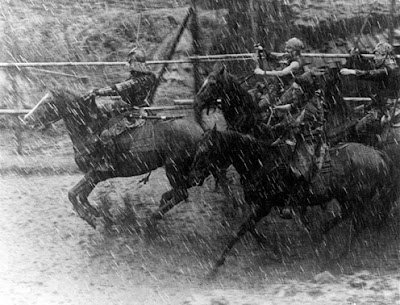 Did anything surprise you about this film?
Did anything surprise you about this film?Alex: Lots of things, actually. I was pretty terrified of sitting through a three-plus hour flick, especially since some of the other films we watched tended to drag in places. I was pretty shocked at how deeply involved in the film I got.
Nathaniel: Spoiler alert and all that, but... people die. And not just anybody. People with names. Good guys and bad guys alike. Sometimes it was oddly poetic, and sometimes it was tragic, but nothing ever happened strictly for shock or entertainment value. The story never felt forced in that regard--when it was someone's time to go, it was because the sequence of events had led to that point, not because it seemed like a good idea at the time.
 How did Toshiro Mifune's performance here compare to what we saw in the previous four films?
How did Toshiro Mifune's performance here compare to what we saw in the previous four films?Alex: Boy, he plays such a wide range of characters in these movies, it's really amazing. It seems like the most difficult part in each movie goes to Mifune, and he always handles the roles with the utmost skill.
In Samurai especially, Mifune balanced a somewhat maniacal, sometimes drunken demeanor with this sense of nobility and honor. It was quite an impressive performance.
Nathaniel: Each of the roles we've seen has had something in common with at least one of the other roles we've seen, but Mifune always plays a different character, and as Alex pointed out, it's usually the most difficult part in the movie.
In a way, it's been like watching the actor evolve--in Rashomon, for example Mifune plays a madman with moments of frightening sanity; in Samurai, he plays a slightly more controlled and honorable madman whose madness begins to make sense as more of his troubled character is revealed. Even when Mifune plays a character that's similar to another he's already played, he still manages to draw out something unique to differentiate them, and his role in Samurai is no exception.
 Looking back on The Hidden Fortress, Ran, Yojimbo, Rashomon, and Seven Samurai, which film was your favorite? Least favorite?
Looking back on The Hidden Fortress, Ran, Yojimbo, Rashomon, and Seven Samurai, which film was your favorite? Least favorite?Nathaniel: Going into these films, all I knew about Kurosawa was that he was something of a legendary director. I had incredibly high expectations of innovation and novelty, and because The Hidden Fortress met those expectations, the bar was set very high for the movies that followed, which is part of why Fortress remains my favorite. I'm also a sucker for comedy, so the humor didn't hurt.
As I watched more of Kurosawa's films, I came to realize that my expectations were not necessarily unreasonable, but rather that they were not founded on a proper understanding of movie history and international cinema. After Fortress' impressive visuals and unique action sequences and and incredibly natural-sounding dialogue that blew away most of the other movies I've seen from the time period, I expected Ran would be equally revolutionary.
I'll be honest; I was disappointed. Consequently, Ran is easily my least favorite of the bunch, though much of that also has to do with the fact that it's very much a war movie, which just isn't my bag. In retrospect, my disappointment with Ran is something akin to being disappointed by a rectangular Christmas gift that you expected to be a mint-condition Daredevil #1 that is actually an autographed photo of Richard Dean Anderson when you're not a fan of Stargate or McGyver.
Alex: For reasons mentioned above, Seven Samurai was my favorite, followed by Rashomon. Rashomon was up there because of how unique the film was, and considering the fact that one character performed a seance in the film (in the 1950s!), I really admired the chances Kurosawa took.
My least favorite would probably be Ran, which, I know, is heresy. I don't know what it was about that film, but I zoned in and out, and Nathaniel and I ended up talking about a bunch of things as the movie was playing.
I wonder if we had saved Ran for later on, if I would have enjoyed it more?
 What do you think of Kurosawa as a director?
What do you think of Kurosawa as a director?Alex: I think he's a filmmaker who takes great care in setting up the intracacies of his films. Often, the first third of a Kurosawa film is devoted to exposition and set up. Still, he manages to pack in tons of story and action.
It's obvious that Kurosawa has an amazing eye for action sequences, and he is clearly an unmatched judge of talent. His actors all deliver exceptional performances, and that's a credit to the director, especially when it comes to films that are the size and scope of Ran and Seven Samurai.
And in the "smallest" film we watched, Rashomon, the acting is brillaint, and the whole film is shot so uniquely that it is just this memorable experience for the viewer. The story stayed with me after it was over, and that's really the best praise for a director.
Nathaniel: Up until watching Kurosawa's films, I never really paid much attention to who the director was. As was once the case with comics, where the writer and artist took a backseat to the fact that it's a Batman story!!!, I was interested in movies because of their premise and/or their cast, but never because of the director.
Kurosawa has shown me just how much of an impact the director has on the film; most of the movies we've watched might have bored me to tears in the hands of a less-capable director, but Kurosawa's attention to detail, finesse with cinematography, and ability to tell a powerful story on both a large and small scale is all truly impressive.
Jeez, I was in theater for over seven years; you'd'a thought I'd'a figured this out sooner.
Of course, I can't give Kurosawa all the credit for starting to pay attention to the director; Mikey Bay is pretty hard to ignore.
 How worthwhile was it to explore this fandom?
How worthwhile was it to explore this fandom?Nathaniel: As a fan of Japanese culture, Kurosawa's films have helped to give me a greater appreciation for a country I already appreciate, and on top of that, the films were pretty entertaining. As a budding movie buff, these films were a valuable next step my self-education, and they've piqued my interest once again in foreign films. Also, they got me out of going on a ghost hunt, so there's that.
Either way, I think it's safe to say that you'll see more reviews of Kurosawa films in the future.
Alex: I think I went into this experiment in the exact right way. I knew next to nothing about Kurosawa and his films, other than the fact that he was mentioned in a song by the Barenaked Ladies in the late nineties.
Actually, I thought we were going to be watching kung fu movies. Yeah, I'm not that bright.
So sitting down and watching these things was a completely new and different experience for me, with very little in the way of expectations. Other than a few reccomendations for a couple of the films, I honestly had no idea what to expect.
In the end, I'm really glad you all voted on this fandom because I enjoyed the films, and I am very happy to have added them to my geek cred.
Though, I still think it would be priceless if we could all get Nathaniel to go on a ghost hunt...
